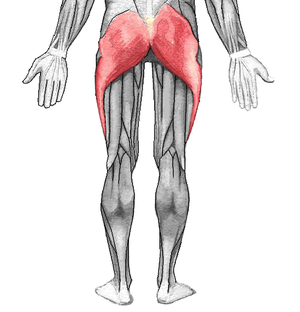 Image via Wikipedia
Image via WikipediaA “pain in the rear” is a familiar phrase that refers to a nagging problem, a distraction that won’t go away easily. Why is it so familiar? How did “a pain in the rear” become so special? History, custom and language have led us to accept the idea of a problem that won’t go away, retuning over and over, that we can we can do little about. It can refer to our physical bodies or our emotional or mental states.
Speaking of our physical state, did talking about the phrase start you shifting in your seat? Have you had hip or buttock pain within the last few months? Does it hurt to sit or to walk for some distance? It’s likely that a large majority of you answered yes to one of those questions. So we can see the phrase comes from our present as well as our past.
Now for the more important questions:
Do you need to have a pain in the rear?
If you have a pain do you have to suffer with it? Suffering is optional, you know.
Is your pain in your rear “a pain in the rear”?
Commercials try to lead us by always describing how we are in pain. Has there ever been a commercial that begins with us how comfortable and happy we are? Not likely. Suggesting we are having arthritis or muscle pain, we are told constantly we have to take painkillers as if there is no other option. Going to a physician may give us no more satisfaction, with the “pain in our rear” being called some “itis”, bursitis, tendonitis, arthritis and the answer being the same, painkillers. We might believe our pain in the rear is a curse that finds us only to be temporarily lifted with medications.
What if those ideas weren’t true? What if the painkillers were only a cover-up of a problem that could be dealt with naturally and easily? What if the pain could go away and not come back again and again and again? What if the pain we feel is due to a temporary imbalance in the muscles and joints? Could we restore that balance permanently and rid ourselves of our “pain in the rear”?
We would be out of the cycle of pain and painkiller, of curse and temporary relief. Our body retuning and restoring balance and preventing the return our “pain in the rear” would leave us back in control of our health.
When we have “a pain in the rear” we can have our pelvis rotated and not coming back to relaxed neutral, we can have an over contraction of our gluteal muscles, or a torsion of our sacrum. All of these can arise from misuse and overuse, from improper sitting or lifting. All of these can be addressed simply and without the use of drugs. All of these can be prevented from returning through simple postural restorative exercise like Muscle Balance and Function, Somatics and others. All of these “pains in the rear” can be successfully helped with Bowenwork and its accompanying movement training.
So, what do you want “a pain in the rear” that is a pain in the rear or would you like to end the pain cycle and replace it with a cycle of healthy balance?
Please feel free to comment and email me with your questions. These posts are intended to stimulate a discussion of possibilities for health and healing.
Thanks,
Kevin

No comments:
Post a Comment